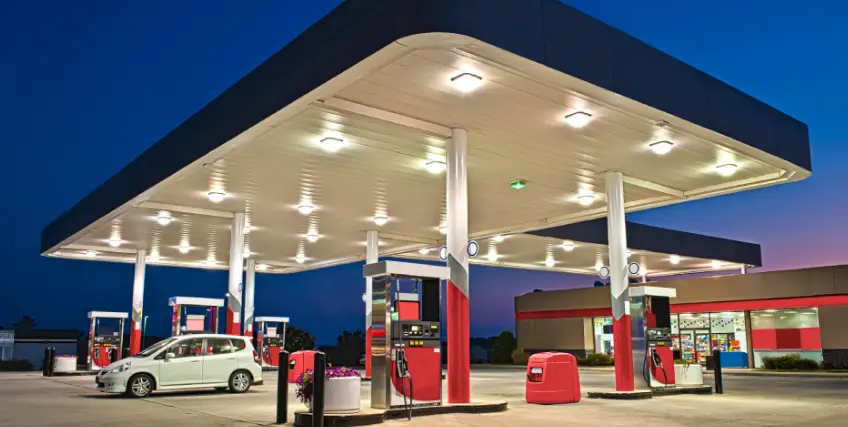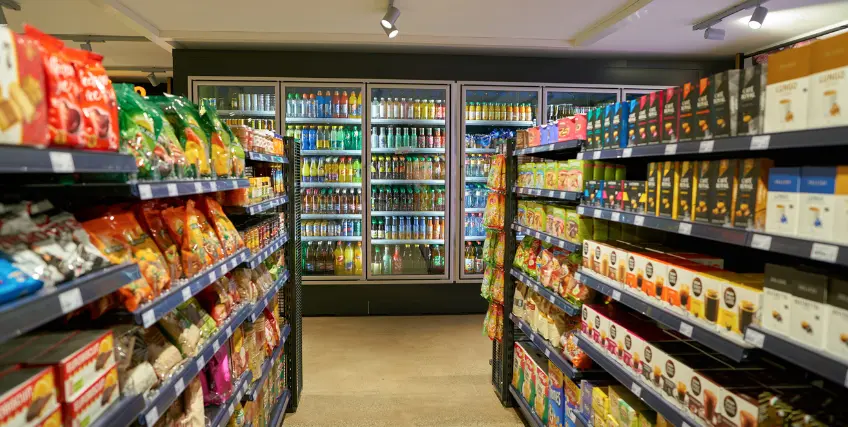Convenience Store Loans
to Power Your Store’s Growth
Get fast access to capital with our reliable convenience store financing options.
Need Financing for Your Business?
Biz2Credit has commercial financing products, such as term loans and revenue-based financing, that help your business grow.
Apply OnlineSet up a Biz2Credit account and apply for business financing
The Financial Landscape of Running a Convenience Store
Convenience stores are probably one of the most popular businesses you would find in the U.S. From the neighborhood mom-and-pop shop to big retail giants, running these mini-marts is not an easy task. They come with their own unique set of financial pressures – inconsistent consumer traffic, sudden equipment breakdowns and more. Such challenges can strain the cash flow of these businesses. Additionally, convenience stores require regular investments in inventory, technology upgrades, and facility maintenance. Traditional financing options often have strict requirements, which makes it difficult for store owners to get the cash when they need it the most. This is where convenience store loans play an important role. Whether it’s covering payroll, upgrading to modern point-of-sale systems, or preparing for seasonal demand spikes, financing options like c-store financing and convenience store equipment financing can enable store owners to remain competitive. Biz2Credit offers customized solutions to meet these specific needs, and in the process, helps convenience store operators to stabilize their operations and seize growth opportunities. With flexible plans and quick funding decisions, store owners can focus on enhancing customer experience and boosting profitability.
Why is Biz2Credit a Top Choice for Convenience Store Loans?
Biz2Credit is a leading platform for convenience store loans, trusted by small business owners across the United States. We specialize in offering fast, flexible financing solutions to meet the ever-changing demands of convenience store operations. Whether you need funding for inventory, new equipment, or renovations, Biz2Credit’s simple online application process ensures you receive quick approvals and minimal paperwork. Our financing options, including gas station convenience store financing and c-store financing, come with competitive rates and repayment terms designed to suit your cash flow. With a dedicated team of funding specialists and years of experience serving convenience store owners, we provide the right tools to help your business thrive. Thousands of American convenience store owners trust Biz2Credit to provide the capital they need to grow, expand, and improve profitability.
Our Strengths:
- Repayment Simplicity: We have simple repayment options for convenience store loans and other financing with flexible repayment terms. See your payment schedule and make payments any time in your Biz2Credit account.
- Dedicated Funding Specialists: Consult a funding specialist to determine what financing options fit your business best or get help at any time along the way as you complete our online funding application.
Convenience Store Loans to Power Your Business Expansion
Convenience store loans play a critical role in helping business owners maintain smooth operations and achieve long-term growth. Convenience stores often face frequent operational expenses, from purchasing fresh inventory to upgrading equipment like refrigerators and display units. With convenience store equipment financing, owners can invest in advanced technology that enhances efficiency and reduces costs. Additionally, expanding product lines or adding new services often requires upfront capital. Financing options like c-store financing and gas station convenience store financing offer the flexibility to fund these initiatives without straining day-to-day cash flow. Whether you need short-term funding or long-term growth capital, Biz2Credit provides a range of financing solutions with quick approval and minimal hassle. By leveraging our flexible repayment plans and industry expertise, you can keep your store stocked, competitive, and ready to meet customer demands.
Explore Convenience Store Financing Designed for Your Business Needs
1. Term Loans for Convenience Stores
Term loans provide convenience store owners with upfront capital that can be repaid over a fixed period. These loans are ideal for large investments, such as store expansions, significant renovations, or upgrading equipment. With a predictable repayment schedule and fixed interest rates, term loans offer stability, making it easier for business owners to plan their finances. Biz2Credit’s term loans for convenience stores are easy to apply for, with competitive terms and quick financing decisions timelines. Whether you're planning to add a new product line, redesign your store layout, or enhance your marketing efforts, a term loan offers reliable financial support.
Eligibility Criteria:
- Minimum 18 months in business
- Annual revenue of $250,000 or more
- A credit score of 650 and above
2. Revenue-Based Financing for Convenience Stores
Revenue-Based Financing is a flexible funding option that aligns repayments with your store’s cash flow. Instead of fixed monthly payments, this option allows you to repay a percentage of your monthly revenue, meaning lower payments during slower months. This flexibility is crucial for convenience stores that experience seasonal fluctuations. Biz2Credit’s revenue-based financing helps store owners maintain cash flow while managing day-to-day operations. Since repayments are directly tied to revenue, it reduces financial strain during off-peak periods. This financing can be used for various purposes, including convenience store equipment financing, paying suppliers, or handling unexpected expenses.
Eligibility Criteria:
- A credit score of 575 and above
- Minimum of 12 months in operation
- Annual revenue of $250,000 or more
3. Commercial Real Estate Loans for Convenience Stores
commercial real estate loans are perfect for store owners looking to purchase property, renovate existing spaces, or expand their footprint. These loans use the equity in your business property and offer longer repayment terms with competitive interest rates. Whether you're planning to upgrade your store or open a new branch, Biz2Credit provides flexible and fast CRE loans tailored to your needs. Additionally, this type of financing helps convenience store owners secure locations in high-traffic areas, which is crucial for increasing footfall and sales. With Biz2Credit’s streamlined application process, you can unlock growth opportunities quickly.
Eligibility Criteria:
- Minimum of 18 months in business
- A credit score of 650 and above
- Property as collateral
- Annual revenue of $250,000 or more.
The Key Benefits of Convenience Store Loans
Improved Cash Flow Management
Cash flow is crucial for convenience stores that operate on thin margins. Regular expenses like inventory replenishment, employee wages, and utility bills can strain working capital. With convenience store loans, you can maintain a steady cash flow, ensuring that your operations run smoothly even during slow seasons. Financing helps cover essential costs without disrupting daily operations, allowing you to focus on serving your customers. Moreover, having a reliable source of working capital ensures that your store is always stocked with essential items, reducing the risk of losing sales due to empty shelves.
Expansion Opportunities
Looking to add a new location or expand your existing store? Expansion requires significant capital, from acquiring real estate to stocking additional inventory. C-store financing provides the financial support needed for growth initiatives, letting you scale without straining your existing resources. Whether it's opening a new store in a different neighborhood or increasing your store's size to accommodate more products, Biz2Credit's financing solutions help you achieve these goals. Expanding your convenience store footprint can significantly boost your market presence and long-term profitability.
Equipment Upgrades
Modern equipment is essential for improving efficiency and enhancing customer experience. Whether it's a new refrigeration unit, advanced POS systems, or automated checkout counters, convenience store equipment financing ensures you can invest in the latest technology. Upgrading equipment helps reduce operating costs and improves service delivery, giving your store a competitive edge. Additionally, energy-efficient equipment can lower utility expenses, contributing to long-term savings. Biz2Credit’s fast approvals and flexible repayment terms make it easier for store owners to access the equipment they need without delay.
Inventory Management
Keeping shelves stocked with a wide range of products is vital for attracting customers. However, purchasing inventory in bulk can strain cash flow. Business loans for convenience stores offer immediate capital to purchase inventory, ensuring that your store always has what customers need. This helps improve sales and customer satisfaction. Moreover, having sufficient inventory during peak seasons or promotional events ensures that your store never misses out on potential revenue. With Biz2Credit's financing solutions, you can maintain optimal stock levels year-round.
How to Apply for Convenience Store Loans
Simple steps to secure a convenience store loan with Biz2Credit.

Success Stories from Convenience Store Owners
Small Business Loans in Convenience Store Loans Articles
The Fuel for Success: Innovative Ways to Finance Your Gas Station Convenience Store
Convenience stores, like Circle-K, 7-Eleven, Wawa, or EG America, are cornerstones of many communities. But most aren’t owned by large corporations—over 60%
Rising Stars in a Tight Credit Market: Gas Stations & Convenience Stores
Gas stations with convenience stores have long been an enduring staple in the retail landscape, offering both necessity and convenience to consumers on the go.
Is Business Financing the Right Choice for Your Convenience Store Expansion?
Expansion is one of the best ways to increase your competitive edge and raise profit potential, and a convenience store business loan may help you do just that.
FAQs on Convenience Store Loans
1. What types of financing options are available for convenience store owners?
Convenience store owners have access to various financing solutions to meet different business needs. Convenience store loans from Biz2Credit include term loans, revenue-based financing, and commercial real estate loans. Term loans provide upfront capital for long-term investments like expansions or major renovations, while revenue-based financing offers flexible repayment terms linked to your monthly revenue. Additionally, gas station convenience store financing and c-store financing options help store owners manage cash flow, purchase equipment, and invest in growth opportunities. Whether you need short-term cash or long-term capital, Biz2Credit offers tailored financing solutions designed to support your store’s success.
2. Can I use convenience store loans to upgrade my equipment?
Convenience store equipment financing is designed to help owners upgrade or purchase essential equipment. Whether you need new refrigeration units, display shelves, or POS systems, Biz2Credit offers fast and flexible financing options to meet these needs. Up-to-date equipment enhances store efficiency, improves the shopping experience, and helps reduce operational costs over time. With quick approvals and flexible repayment terms, you can invest in modern equipment without depleting your cash reserves.
3. Can I get financing to expand my convenience store to multiple locations?
Expanding your convenience store to multiple locations is a significant business move that often requires considerable capital. Biz2Credit offers business loans for convenience stores that can be used for real estate acquisition, store renovations, and initial inventory stocking for new branches. Expansion financing enables you to scale your operations without draining your existing resources. Whether you’re opening a new store in a high-traffic area or upgrading an existing location, our convenience store loans provide flexible funding with competitive interest rates. Additionally, if you’re expanding a gas station with a convenience store, our gas station convenience store financing options can help cover both fuel-related expenses and retail upgrades. With a fast and easy online application process, Biz2Credit ensures that you can secure the capital needed to grow your business efficiently.
4. What are the common uses for convenience store loans?
Convenience store owners often seek convenience store loans to support various business needs. Common uses include purchasing inventory to ensure shelves remain fully stocked with high-demand products, upgrading essential equipment such as refrigerators, POS systems, and display units, or investing in renovations to enhance the store’s appeal. Additionally, loans can help manage cash flow during slow seasons, cover daily operational expenses like payroll and utilities, and finance marketing campaigns. For gas station owners with attached convenience stores, gas station convenience store financing can offer tailored capital solutions to handle fuel costs alongside store expenses. Biz2Credit provides flexible loan options, enabling convenience store owners to access fast, hassle-free funding tailored to their business’s unique requirements. By utilizing these convenience store loan options effectively, convenience stores can boost profitability, enhance customer experience, and maintain a competitive edge in the retail market.
Frequent searches leading to this page



